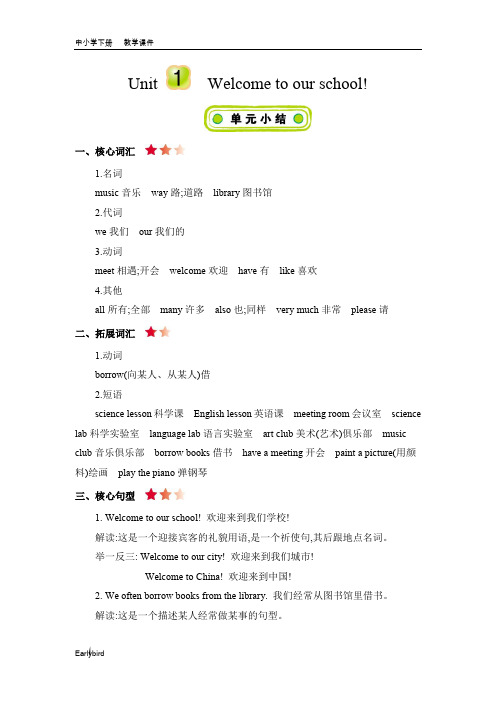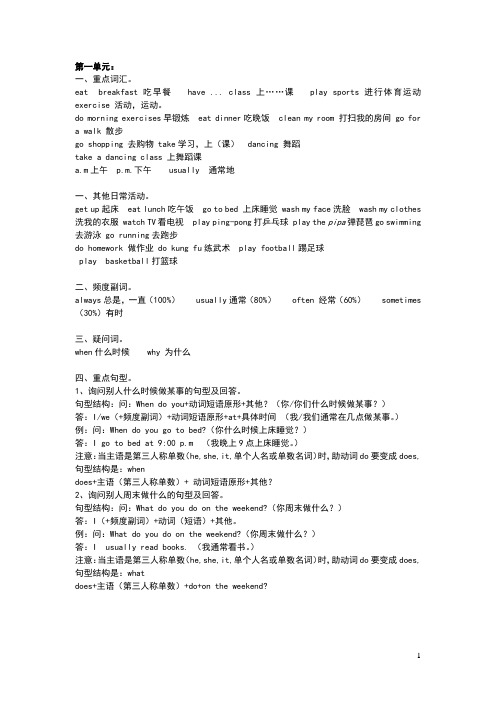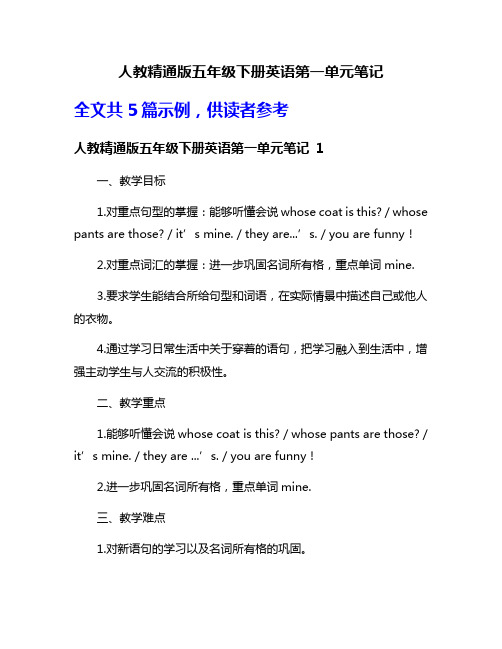2020春精通版五年级英语下册复习- Unit 1 知识清单
五下Unit1重点知识

五下Unit 1单词:1 remember 记住2 mushroom蘑菇3 question问题4 hurt受伤5 prince王子6 fairy仙女7 why为什么8 because因为9 clothes服装10 pick 采摘11 put on穿上12 脱下13 understand理解14 let 让15 late 迟的16 before 在…以前17 fit 合身18 party聚会19 help帮助词组:2 so sad 如此伤心1 at the prince’s house 在王子的宫殿3 come back 回来4 have to 不得不5 visit every house拜访每一间屋子6 fairy tales童话故事7 Monkey King美猴王8 find some mushrooms找到一些蘑菇9 draw a dress画一条连衣裙10 for her friend 为她的朋友11 have some snacks吃一些零食12 have a drink喝一杯13 fit well很合适14 look so nice看起来那么漂亮15 can’t understand不能理解16 would like to do想要做某事17 be bad for us对我们有害18 take off the shoes脱下鞋子19 go to the party参加聚会20 three fairies三个仙女21 try it on试穿它22 have to go不得不走24 at the parties在那些聚会上23 before twelve o’clock在12点以前25 beautiful clothes美丽的衣服26 a lot of mushrooms许多蘑菇27 under the tree在树下28 try on the shoes试穿鞋子29 eat them吃了它30 find the girl找到女孩31 why can’t you…你为什么不能…32 leave…behind丢下…33 hurry up赶快34 find some drinks找到一些饮料35 some question words 一些疑问句36 fit me适合我37 draw a picture for me为我画一幅画38 have a drink 喝一份饮料39 look so nice看起来那么漂亮40 be at school在校学习41 read a story about 读一个有关…的故事42 pick a big and red mushroom 采一个又大又红的蘑菇句型:1 Come and help me. 过来帮我。
2020春精通版五年级英语下册复习- Unit 1 知识清单

Unit Welcome to our school!一、核心词汇1.名词music音乐way路;道路library图书馆2.代词we我们our我们的3.动词meet相遇;开会welcome欢迎have有like喜欢4.其他all所有;全部many许多also也;同样very much非常please请二、拓展词汇1.动词borrow(向某人、从某人)借2.短语science lesson科学课English lesson英语课meeting room会议室science lab科学实验室language lab语言实验室art club美术(艺术)俱乐部music club音乐俱乐部borrow books借书have a meeting开会paint a picture(用颜料)绘画play the piano弹钢琴三、核心句型1. Welcome to our school! 欢迎来到我们学校!解读:这是一个迎接宾客的礼貌用语,是一个祈使句,其后跟地点名词。
举一反三: Welcome to our city! 欢迎来到我们城市!Welcome to China! 欢迎来到中国!2. We often borrow books from the library. 我们经常从图书馆里借书。
解读:这是一个描述某人经常做某事的句型。
举一反三: They often borrow some English books from Beijing Library. 他们经常从北京图书馆里借一些英语书。
3. —How many English lessons do you have in a week? 你们一周有多少节英语课?—We have three. 我们有三节。
解读:这是用来询问对方有多少节课的句型。
举一反三: —How many PE lessons do you have in a week? 你们一周有多少节体育课?—We have five. 我们有五节。
课程重点总结(知识清单)人教精通版英语五年级下册

Unit 1背默词汇:library wele meet borrowour we like havemany way please allalso very much often clubborrow books meeting room have a meeting English lesson science lab science lesson art club paint a picture music club play the piano draw and paint language lab重点句子:Part one Wele to + 某个地点。
“欢迎来到某地。
”1.Wele to our school. 欢迎来到我们学校。
2.Wele to our class. 欢迎来到我们班。
3.Wele to our science lab. 欢迎来到我们的科学实验室。
Part two 一般现在时态(含often),表示经常做的事1.句子结构:主语+often + 动词原形/动词三单+ 介词+ 某地。
“某人经常在某地做某事”E.g. We often have meetings in the meeting room.The students often draw and paint in the art club.He often plays the piano in the music lessons.Kate often borrows books in the library.2.一般疑问句:句子结构:Do/Does+ 主语+often+ 动词原形+ 其他?E.g. Do you often have meetings in the meeting room?Do the students often draw and paint in the art club?Does he often play the piano in the music lessons?Does Kate often borrow books from the library?Part three How many...? 对数量进行提问.1.句子结构:How many+可数名词复数+ are there+ 地点短语?“某地有多少某物?”回答:There is + a/an/one + 可数名词单数+ 其他。
2020春五年级英语下册Unit1Myday单元知识梳理人教PE

第一单元:一、重点词汇。
eat breakfast吃早餐 have ... class 上……课 play sports 进行体育运动exercise 活动,运动。
do morning exercises早锻炼 eat dinner吃晚饭 clean my room 打扫我的房间 go for a walk 散步go shopping 去购物 take学习,上(课) dancing 舞蹈take a dancing class 上舞蹈课a.m上午 p.m.下午 usually 通常地一、其他日常活动。
get up起床 eat lunch吃午饭 go to bed 上床睡觉 wash my face洗脸 wash my clothes 洗我的衣服 watch TV看电视 play ping-pong打乒乓球 play the pipa弹琵琶go swimming 去游泳 go running去跑步do homework 做作业 do kung fu练武术 play football踢足球play basketball打篮球二、频度副词。
always总是,一直(100%) usually通常(80%) often 经常(60%) sometimes (30%)有时三、疑问词。
when什么时候 why 为什么四、重点句型。
1、询问别人什么时候做某事的句型及回答。
句型结构:问:When do you+动词短语原形+其他?(你/你们什么时候做某事?)答:I/we(+频度副词)+动词短语原形+at+具体时间(我/我们通常在几点做某事。
)例:问:When do you go to bed?(你什么时候上床睡觉?)答:I go to bed at 9:00 p.m (我晚上9点上床睡觉。
)注意:当主语是第三人称单数(he,she,it,单个人名或单数名词)时,助动词do要变成does,句型结构是:whendoes+主语(第三人称单数)+ 动词短语原形+其他?2、询问别人周末做什么的句型及回答。
人教精通版五年级下册英语第一单元笔记

人教精通版五年级下册英语第一单元笔记全文共5篇示例,供读者参考人教精通版五年级下册英语第一单元笔记1一、教学目标1.对重点句型的掌握:能够听懂会说whose coat is this? / whose pants are those? / it’s mine. / they are...’s. / you are funny!2.对重点词汇的掌握:进一步巩固名词所有格,重点单词mine.3.要求学生能结合所给句型和词语,在实际情景中描述自己或他人的衣物。
4.通过学习日常生活中关于穿着的语句,把学习融入到生活中,增强主动学生与人交流的积极性。
二、教学重点1.能够听懂会说whose coat is this? / whose pants are those? / it’s mine. / they are ...’s. / you are funny!2.进一步巩固名词所有格,重点单词mine.三、教学难点1.对新语句的学习以及名词所有格的巩固。
2.学生能结合所给句型和词语,在实际情景中描述自己或他人的衣物。
四、教学准备1.扮演角色所用头饰,单词卡。
2.与教材相配的课件。
五、教学过程step 1. warm-up1. let’s review教师呈现图片,让学生记忆图片上的衣服,记忆上节课所学词汇。
t: do you remember these clothes? s: yes!dress,skirt,...2. let’s say找几位同学描述一下自己的衣服。
(例如:a yellow shirt and black pants)设计意图:简单的热身交流,并复习上节课内容,提高学生兴趣,使学生进入上课状态。
step 2. presentation1. let’s learn教师随机指一位学生a的t恤并对他提问,is this yours?学生回答,yes,it is.然后问全班同学whose t-shirt is this?其他学生回答it’s a’s.并引导a同学回答it’s mine.帮助同学理解mine的含义。
五年级下册英语第1单元

五年级下册英语第1单元
五年级下册英语第1单元的标题是“My Day”。
这一单元主要围绕学生的日常生活展开,通过学习,学生可以掌握描述自己一天中不同时间段的活动和日常习惯的表达方式。
以下是五年级下册英语第1单元的主要内容和知识点:
1.新词汇:学习新的单词和短语,如“get up”(起床)、“eat breakfast”(吃
早饭)、“have classes”(上课)等,以及与日常生活相关的词汇。
2.重点句型:学习如何使用现在进行时描述正在进行的动作,例如“I’m
getting up.”(我正在起床。
)以及如何使用一般现在时描述日常习惯,例如“I usually eat breakfast at 7:00.”(我通常7点吃早饭。
)
3.对话和短文:通过阅读对话和短文,了解如何用英语描述自己的一天,包括
起床、吃早饭、上学、上课、吃午饭、放学、做家庭作业和睡觉等日常活动。
4.语音和语调:学习正确的语音和语调,以便更自然地表达日常活动。
5.文化知识:了解不同国家和地区的日常生活习惯和作息时间,增加跨文化交
流的能力。
通过学习这一单元,学生可以提高自己的英语口语和书面表达能力,更好地用英语描述自己的日常生活和习惯。
学生还可以学习如何合理安排时间,养成良好的生活和学习习惯。
1/ 1。
人教精通版小学五年级下册英语第1单元学习笔记
Gao Wei and Li Yan: Yes.We all like it.
高伟和李燕:是的。我们都喜欢它。
Visitor: And you speak English very well.
参观者:你们英语说得非常好。
Gao Wei and Li Yan: Thank you very much.
三会句型:
We often borrow books from library. 我们经常从图书馆借书。
固定短语:
welcome to...欢迎来到...our school我们的学校
show.........around....... 带领......参观.......
borrow......from...... 从....借....
高伟:是的。我们今天下午将在里面开会。
Visitor: Oh, that's great!
参观者:哦,那很棒!
Lesson3—4学习笔记
四会单词
we have all like very much
我们 有 所有、全部 喜欢 非常、很
三会单词
science lab 科学实验室 science lesson 科学课
参观者:你们一周有多少节美术课?
Li Yan: We have two.
李燕:我们有两节。
Gao Wei: This is our music club.We often sing and dance here.
高伟:这是我们的音乐俱乐部。我们经常在这里唱歌和跳舞。
Visitor: How many music lessons do you have in a week?
2020春人教PEP版五年级英语下册课件-Unit 1 知识清单
Unit 1 My day一、核心词汇1.动词: take 学习;上(课)2.名词: dancing跳舞;舞蹈exercise活动;运动3.短语: do morning exercises做早操eat breakfast吃早饭play sports进行体育运动eat dinner吃晚饭go for a walk散步go shopping去买东西;购物clean my room 打扫我的房间take a dancing class 上舞蹈课have … class 上……课二、了解词汇1.动词: start开始shop去买东西;购物work工作need需要live居住win获胜sound听起来好像2.名词: Spain西班牙play戏剧;剧本letter信island岛cave山洞;洞穴3.介词: after在(时间)后4.其他: when什么时候;何时late晚;迟 a.m.午前;上午p.m.午后;下午why为什么last上一个的;刚过去的also还;也busy忙的5.拓展词汇——频率副词(1)定义: always, usually, sometimes等词叫作频率副词,用来表示动作发生的频率,但程度上有区别。
按频率大小可做如下排列: always > usually > sometimes(2)位置:频率副词一般放在主语之后、实义动词之前。
I always get up at 6:30. 我总是六点半起床。
I usually watch TV on the weekend. 我周末通常看电视。
(usually也可用于句首)I sometimes visit my grandparents. 有时我看望我的祖父母。
(sometimes也可以放在句首)6.短语:watch TV看电视eat lunch吃午饭go to bed上床睡觉go swimming去游泳 go home回家go to school去上学三、核心句型1.— When do you do morning exercises? 你什么时候做早操?— At 7 o’clock. 七点。
五年级下册第一单元英语知识点
五年级下册第一单元英语知识点English:The first unit of Grade 5 covers a range of English language skills, including learning how to introduce oneself, talking about hobbies, expressing likes and dislikes, and describing daily routines. Students will also be introduced to vocabulary related to family members, numbers, and telling the time. They will practice using these new words and phrases in conversations and written exercises to improve their speaking, listening, reading, and writing abilities. Additionally, students will learn about simple present tense verbs and how to form questions and negative sentences. Through various interactive activities, games, and worksheets, students will have the opportunity to apply and reinforce the knowledge and skills they have learned in the classroom, enabling them to communicate effectively in English.中文翻译:五年级的第一个单元涵盖了一系列的英语语言技能,包括学习如何介绍自己,谈论爱好,表达喜好和厌恶,描述日常作息。
五年级下册英语第一单元知识点
五年级下册英语第一单元知识点一、词汇部分1. Days of the week- Monday- Tuesday- Wednesday- Thursday- Friday- Saturday- Sunday2. Activities- Go to school- Have class- Play games- Do homework- Watch TV- Read books- Go shopping- Visit grandparents3. Adverbs of frequency- Always- Usually- Often- Sometimes- Rarely- Never二、句型部分1. What do you do on weekends?- I play games on weekends.- I do homework on weekends.2. What does he/she do on weekends?- He/She watches TV on weekends.- He/She visits grandparents on weekends.3. What do they do on weekends?- They go shopping on weekends.- They read books on weekends.4. Adverbs of frequency in sentences- I always play games with my friends.- She usually does her homework after school.- We often watch TV in the evening.- They sometimes go shopping on weekends.- He rarely reads books.- She never visits her grandparents.三、语法部分1. Present simple tense- Affirmative: I/You/We/They + base form of the verb- Negative: I/You/We/They + do not + base form of the verb - Question: Do + I/You/We/They + base form of the verb? - He/She/It: follows the base form of the verb with 's' or 'es'2. Using adverbs of frequency- Adverbs of frequency are placed before the main verb in a sentence.3. Days of the week- Capitalize the first letter of each day of the week.四、阅读部分1. Short passages about weekend activities- Readingprehension questions related to the passages- Describing one's own weekend activities2. Matching activities with the days of the week- Matching the correct activity with the corresponding day of the week- Describing the activities of each day3. Writing about one's own weekend activities- Describing the activities one does on weekends using adverbs of frequency- Using simple present tense to talk about weekend activities五、口语部分1. Role-playing conversations- Conversations about weekend activities- Practicing asking and answering questions about weekend activities2. Describing weekend activities- Speaking confidently and fluently about one's own weekend activities- Using appropriate adverbs of frequency in speech六、写作部分1. Writing sentences using adverbs of frequency- Writing sentences about one's own activities using adverbs of frequency- Describing the frequency of various activities2. Short paragraph writing about weekend activities- Writing a short paragraph about one's own weekend activities - Using simple present tense and adverbs of frequency in writing总结五年级下册英语第一单元知识点主要包括词汇、句型、语法、阅读、口语和写作部分。
- 1、下载文档前请自行甄别文档内容的完整性,平台不提供额外的编辑、内容补充、找答案等附加服务。
- 2、"仅部分预览"的文档,不可在线预览部分如存在完整性等问题,可反馈申请退款(可完整预览的文档不适用该条件!)。
- 3、如文档侵犯您的权益,请联系客服反馈,我们会尽快为您处理(人工客服工作时间:9:00-18:30)。
Unit Welcome to our school!
一、核心词汇
1.名词
music音乐way路;道路library图书馆
2.代词
we我们our我们的
3.动词
meet相遇;开会welcome欢迎have有like喜欢
4.其他
all所有;全部many许多also也;同样very much非常please请
二、拓展词汇
1.动词
borrow(向某人、从某人)借
2.短语
science lesson科学课English lesson英语课meeting room会议室science lab科学实验室language lab语言实验室art club美术(艺术)俱乐部music club音乐俱乐部borrow books借书have a meeting开会paint a picture(用颜料)绘画play the piano弹钢琴
三、核心句型
1. Welcome to our school! 欢迎来到我们学校!
解读:这是一个迎接宾客的礼貌用语,是一个祈使句,其后跟地点名词。
举一反三: Welcome to our city! 欢迎来到我们城市!
Welcome to China! 欢迎来到中国!
2. We often borrow books from the library. 我们经常从图书馆里借书。
解读:这是一个描述某人经常做某事的句型。
举一反三: They often borrow some English books from Beijing Library. 他们
经常从北京图书馆里借一些英语书。
3. — How many English lessons do you have in a week? 你们一周有多少节英语课?
— We have three. 我们有三节。
解读:这是用来询问对方有多少节课的句型。
举一反三: — How many PE lessons do you have in a week? 你们一周有多少
节体育课?
— We have five. 我们有五节。
四、了解句型
1. And you speak English very well. 并且你们英语说得非常好。
解读:这是一个肯定句, very well的意思是“非常好”,修饰实义动词,放在句尾。
举一反三: We speak Chinese very well. 我们汉语说得非常好。
2. I like singing. 我喜欢唱歌。
解读: like是动词,意为“喜欢”,后面跟动名词形式,表示一个人的爱好、嗜好。
举一反三: I like dancing. 我喜欢跳舞。
I like swimming. 我喜欢游泳。
